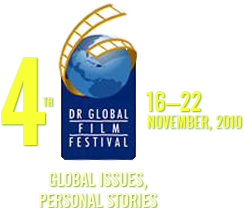- Film Title (Original): Traces of the Trade:
A Story from the Deep North - Title (Spanish):Tras las Huellas de mis Ancestros: La Historia Oculta de Nueva Inglaterra.
- Country Of Origin: USA
- Year Of Completion: 2008
- Running Time: 86:03 min.
- Format/Color/Bw:: Format, Color
- Language: English with Spanish subtitles
- Country Spotlight: Australia
Australia con 6 peliculas - Country Spotlight: Francia
Fracia con 3 peliculas - 127 Horas
Film Title (Original): 127 Horas - 3 to the Rescue
Film Title (Original): 3 Al Rescate - A Small Act
Film Title (Original): A Small Act - Better Mus' Come
Film Title (Original): Better Mus' Come - Boys of Summer
Film Title (Original): Boys of Summer - Buscón: Searcher/Swindler
Film Title (Original): Buscón - Carancho
Film Title (Original): Carancho - Countdown to Zero
Film Title (Original): Countdown to Zero - Eyes Wide Open
Film Title (Original): Eyes Wide Open - Jean Gentil
Film Title (Original): Jean Gentil - José Martí: The eye of canary
Film Title (Original): José Martí - Rain of Hope
Film Title (Original): Pluie D'espoir - Love Child
Film Title (Original): La Hija Natural - La Yuma
Film Title (Original): La Yuma - Leo's Room
Film Title (Original): El Cuarto de Leo - Lumumba
Film Title (Original): Lumumba - Máximo Gómez: Son of Fate
Film Title (Original): Máximo Gómez Hijo del Destino - Monica and David
Film Title (Original): Monica and David - Moloch Tropical
Film Title (Original): Moloch Tropical - Mother and Child
Film Title (Original): Mother and Child - Never Let Me Go
Film Title (Original): Never let me Go - Nuremberg : Its Lesson for Today
Film Title (Original): Nuremberg: Its Lesson for Today [The Schulberg/Waletzky Restoration] - Oceans
Film Title (Original): Oceans - Portraits in a Sea of Lies
Film Title (Original): Retratos en un mar de mentiras - Presumed Guilty
Film Title (Original): Presunto culpable - Restrepo
Film Title (Original): Restrepo - Puzzle
Film Title (Original): Rompecabezas - Revolution
Film Title (Original): Revolución - Seraphine
Film Title (Original): Seraphine - Sometimes In April
Film Title (Original): Quelques jour en avril - Sins of my Father
Film Title (Original): Pecados de mi padre - Southern District
Film Title (Original): Zona Sur - The American
Film Title (Original): The American - The Man Next Door
Film Title (Original): El Hombre de al lado - To Catch a Dollar: Muhammad Yunus Banks on America
Film Title (Original): To Catch a Dollar: Muhammad Yunus Banks on America - To the Sea
Film Title (Original): Alamar - The Loss
Título Original: La Pérdida - The Man by the Sore
Título Original: L'homme Sur Les Quais - Traces of the Trade:
A Story from the Deep North
Film Title (Original): Traces of the Trade: A Story from the Deep North - Waste Land
Film Title (Original): Waste Land - Heart and Soul The Documentary
Film Title (Original): Voz y Alma El Documental
FILM CREDITS:
- Director: Katrina Browne
- Co-Directors: Alla Kovgan and Jude Ray
- Executive Producer(s): Elizabeth Delude-Dix and Jude Ray
- Producer(s): Juanita Brown
- Cinematographer: Liz Dory
- Editor: Natacha Valerga
- Music: Roger C. Miller
- Cast: Katrina Browne, Keila DePoorter, Tom DeWolf, Holly Fulton, Elly DeWolfe Hale, Ledlie Laughlin, Dain Perry, James DeWolf Perry, Jim Perry, Elizabeth Sturges Llerena.
FILM SYNOPSIS:
In Traces of the Trade, Producer/Director Katrina Browne discovers that her forefathers were the largest slave-trading family in U.S. history. The film follows Browne and nine fellow family members as they retrace the steps of the Triangle Trade, visiting the DeWolf hometown of Bristol, Rhode Island, slave forts on the coast of Ghana, and the ruins of a family plantation in Cuba. Browne pushes the family forward as they struggle through the minefield of race politics. Back home, the family confronts the thorny topic of what to do now. In the context of growing calls for reparations for slavery, family members struggle with the question of how to think about and contribute to “repair.” Meanwhile, Browne and her family come closer to the core: their love/hate relationship with their own Yankee culture and privileges; the healing and transformation needed not only “out there,” but inside themselves.
In a groundbreaking approach, Traces of the Trade invites viewers to consider how the system of slavery affected the white populations of the time, their descendants, and subsequent generations of white Americans. It invites all to ask: What history do we inherit as individuals and as citizens? How does Northern complicity change the equation? What would repair—spiritual and material—really look like and what would it take
DIRECTOR’S BIOGRAPHY:

Katrina Browne devoted 9 years to the making of Traces of the Trade, and to the related family and community dialogue process. Previously, she served as Outreach Planning Coordinator for the film adaptation of Anna Deavere Smith’s award-winning play Twilight: Los Angeles, helping develop its outreach campaign for inter-racial dialogue. Earlier, she worked as senior staff at Public Allies, an AmeriCorps program, now operating in 15 cities, that she co-founded in 1991 to recruit more young people and people of color into the public interest sector. Katrina has an M.A. in Theology from the Pacific School of Religion where she wrote a thesis comparing the role that Greek tragedies played in civic life in ancient Greece to the untapped potential of film to catalyze civic dialogue today.













